
As we age, our bodies don’t always work as well as they used to, which opens us up to more (and more serious) illnesses. One of these illnesses is prostate cancer, and it can be very dangerous if not detected early.
You might be looking for a long list of “early warning signs” of prostate cancer, so that you can do just that: catch it early. Unfortunately, though, no such list exists. There are few to no symptoms of prostate cancer in its early stages. It is what is known as a “silent disease,” meaning that in many cases, symptoms don’t appear until the later stages, if ever, and the disease can only be found if you are looking for it.
This is why it is imperative for men, especially if they are over fifty, and especially if there is a history of cancer in the family, to have a yearly screening to check for anomalies. The only real way to know if one has prostate cancer is to look for it, so you and your senior care aide must be adamant about having your loved one checked for prostate cancer when appropriate.
As the disease progresses, though, there are some symptoms that you can look out for. When you see these signs, you will know that something is wrong for sure, and you should make an appointment with the doctor as soon as possible. Symptoms include:
- Trouble urinating – A difficulty in starting the flow of urine when one has to urinate can be a sign that something is going on with the prostate. Another sign is a problem stopping the urine once it has started, or holding back the flow. A weak urine flow can also be a sign that things aren’t working correctly, as can dribbling, and a flow that stops and starts against one’s will.
- Blood in the urine – Blood that is coming out of any body part when it shouldn’t be is always a cause for concern. If blood appears in the urine, this is a fairly clear sign of prostate cancer, and should be looked into right away. If you or your senior care aide don’t have to help your loved one use the restroom, you should create an open dialogue about these issues so that your loved one will feel comfortable speaking to you if they notice any problems such as this.
- Painful urination – Urinating shouldn’t burn or hurt, and if it does, this could point to a problem in the prostate. It could also be a sign of a urinary tract infection, but it is important to see a doctor either way, so that you can know for sure.
- Pain in lower body – Pain or stiffness in the lower parts of the body, such as the lower back, thighs, pelvic area, and hips can be a more outward sign that something is wrong inside. This, in conjunction with any of the other symptoms listed above, should be enough to urge you to schedule a checkup.
Prostate cancer begins with no symptoms, so by the time you start seeing them, this means that the illness has already progressed significantly. That means that you must be active in getting these symptoms checked as soon as you begin to notice them, so your loved one has a better chance of fighting the disease.
If you or an aging loved one are in need of senior care services in Plainview, NY or the surrounding areas, contact the caring professionals at Star Multi Care Services today at (631)956-8835. We are the Right Choice for Home Health Care Services!
Source:
https://www.pcf.org/c/prostate-cancer-symptoms/
- Health Benefits of Yoga for Seniors - April 24, 2025
- How Does Hospice Care Help Aging Adults Plan for the End of Life? - April 16, 2025
- Ways a Client Advocate Can Improve Your Loved One’s Quality of Life - April 9, 2025

